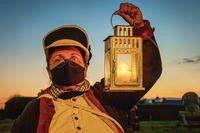When a mom is sick and tired of something, she usually has no qualms about letting you know.
Two moms in particular were sick of sons and fathers dying during the Civil War. The first was Ann Reeves Jarvis, who didn't care which side the sick and dying were on or what uniform they were wearing. The second was Julia Ward Howe, who wrote the still-famous "Battle Hymn of the Republic," inspired by a review of Union troops marching in formation.
Both moms tried to rally all moms around a Mother's Day that would keep those troops alive, reminding people about the true cost of war. Their success was limited, but their example would lead to a Mother's Day that would instead honor "the best mother in the world, your mother."
Those were the words President Woodrow Wilson spoke when he signed the law making Mother's Day a legal holiday in the United States in 1914.

The creation of Mother's Day actually took much longer, and the foundation for the national holiday was laid during the Civil War.
When the War Between the States began in 1861, Jarvis was already at work harnessing the Power of Mom. In her native Appalachia, which would become West Virginia after splitting from Virginia when that state seceded from the Union in 1861, Jarvis began "Mothers' Day Work Clubs" to address the unsanitary living conditions in Appalachian households, which she believed led to high infant mortality rates.
As the war raged on and West Virginia began taking casualties, she shifted her clubs' mission to become a neutral aid group, providing comfort and care to soldiers from both sides of the war. Jarvis pressed the members to disregard the uniform the men were wearing; instead, she urged them to feed and clothe the men when necessary and become nurses when disease broke out among the troops.
After the war, she continued the mom spirit with "Mothers' Friendship Day," bringing together both Union and Confederate veterans in the spirit of reconciliation in 1868. In the face of threats of violence, the sheer force of mom made certain the event not only went off without incident, it ended with everyone singing and dancing.

Julia Ward Howe was a more nationally famous mom, author of books, poems and of course, the "Battle Hymn of the Republic." Her Battle Hymn not only resonated with the Union soldiers and the public during the war, its intense imagery has endured for generations.
Two years after Jarvis' "Mothers' Friendship Day," Howe evoked the Power of Mom once more. This time, the call was to establish a "Mother's Day for Peace," in an effort to end war and celebrate peace. It was also a day for mothers to ask officials not to send their husbands and sons off to die in war. Howe issued a "Mother's Day Proclamation" in 1870, which was celebrated for almost 30 years in cities across the country ... until the United States entered the Spanish-American War in 1898.
In 1905, Jarvis died of heart problems in Philadelphia. By 1907, her daughter Anna, who was her mother's caretaker for the year preceding her death, had taken up the mantle of the Mom (despite never having children of her own), campaigning to create a national U.S. Mother's Day.
"I hope and pray that someone, sometime, will found a memorial mother's day commemorating her for the matchless service she renders to humanity in every field of life," Anna Jarvis once said. "She is entitled to it."
The daughter's campaign to make one of her mother's best ideas a national day of quiet remembrance became something much bigger than she intended -- or even wanted -- but it was all an effort to honor the act of being a mother, and everything that being a mom entailed in America at the time.

There was no religious element to Anna's campaign, nor was there a political motivation beyond the creation of a national day of recognition. She just wanted to honor the effort and sacrifices mothers made in their own homes, which often went unnoticed and underappreciated. She wrote letters, met with officials, printed booklets and gave speeches on the idea.
A 1907 speech memorializing her mother in Grafton, West Virginia, where Jarvis once taught school, inspired locals to hold a Mother's Day on May 10, 1908. When the mayor of Philadelphia learned about it, he instituted a citywide Mother's Day. West Virginia recognized the first statewide Mother's Day in 1910.
It caught fire across the U.S., and by 1911, all states celebrated Mom with an official day. Rep. J. Thomas Heflin of Alabama and Sen. Morris Sheppard of Texas, both Democrats (times were very different back then), introduced a joint resolution calling for a National Mother's Day.
Wilson signed the proclamation designating the second Sunday in May (recalling Grafton, West Virginia's choice of May 10) as a national holiday: Mother's Day was finally the law of the land. Americans loved it just as much as they loved Mom.
For Anna Jarvis, who expected it to be a quiet day of reflection on motherhood, it became a little too commercial once it hit the mainstream. Skyrocketing sales of greeting cards, candy and flowers made Jarvis believe the holiday had been hijacked by profiteers, and she spent the rest of her life campaigning against it.
-- Blake Stilwell can be reached at blake.stilwell@military.com. He can also be found on Twitter @blakestilwell or on LinkedIn.
Want to Learn More About Military Life?
Whether you're thinking of joining the military, looking for post-military careers or keeping up with military life and benefits, Military.com has you covered. Subscribe to Military.com to have military news, updates and resources delivered directly to your inbox.
















